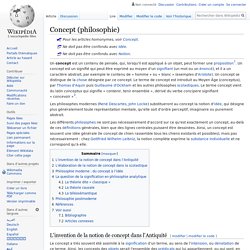

Concept (philosophie) Pour les articles homonymes, voir Concept.

Ne doit pas être confondu avec Idée. Ne doit pas être confondu avec Notion. Les philosophes modernes (René Descartes, John Locke) substitueront au concept la notion d'idée, qui désigne plus généralement toute représentation mentale, qu'elle soit d'ordre perceptif, imaginaire ou purement abstrait. Les différents philosophes ne sont pas nécessairement d'accord sur ce qu'est exactement un concept, au-delà de ces définitions générales, bien que des lignes centrales puissent être dessinées. Ainsi, un concept est souvent une idée générale (le concept de chien rassemble tous les chiens existants et possibles), mais pas nécessairement : chez Gottfried Wilhelm Leibniz, la notion complète exprime la substance individuelle et ne correspond qu'à elle. Le nominalisme considère que les concepts n'ont pas d'existence réelle ou extra-mentale, ils sont seulement psychologiques et subjectifs[5]. Michel Foucault analyse ainsi le rapport du concept à la vie :
La conscience. L’intuition philosophique. Éthique. L'ésthétique. Noétique. Philosophie de l'action. Libre arbitre. Liberté. La nature du temps. Progrès. La nature. Plaisir. Qualité. Thinking. Perception. Altérité. Émergence. I have a problem with the statement “all men are created equal”.

Not just because it only refers to a little under half of the species, nor because it implies a creator, though both of those things grate on me, but because I simply believe that it just isn’t true. Before you start arguing about sexism or racism or any of the other –isms that we’re not supposed to have these days, hear me out. I think those are all nasty ways of looking at the world too. Saying we’re all “equal” just isn’t enough. We need to do better. Equal implies sameness: “two plus two equals four” and all that. To start, let’s compare equality and equity. Which scenario is the most fair? Cute, you may be thinking, the kids can now watch the game. While that sinks in, let’s look at sexism. Many – if not all – of these societal factors are bigger and encompass more of history than any individual can single-handedly influence (it’s not about personal blame), but that doesn’t mean their impacts aren’t real.
Image from.